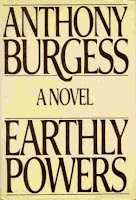This one is a novel called Earthly Powers (1980) by Anthony Burgess, an Englishman better known to Americans as the author of A Clockwork Orange(1962). I picked up a second-hand copy of Earthly Powers a long time ago, and considered reading it in 2016 after we visited Malta, where the story begins.
Graham Greene, Anthony Burgess and video documentaries about writers.
My scramble for a dictionary began with the book's opening words.
"It was the afternoon of my eighty-first birthday, and I was in bed with my catamite when Ali announced that the archbishop had come to see me."
catamiteˈkadəˌmīt
noun (archaic)
a boy kept for homosexual practices.
Here are ten more words unfamiliar to me, as taken from the novel's first 30 pages. Granted, experienced readers usually are able to infer meanings from the context or similar root words; sometimes this even works with James Joyce.
But I try to record unfamiliar words and learn something. Definitions are purloined from numerous on-line sites, and the list ends with a surprise that sheds some light on Burgess's obvious skills as a writer.
---
labile ("lability" as a noun, as written by Burgess)
ˈlāˌbīl,ˈlābəl
adjective
liable to change; easily altered - of or characterized by emotions that are easily aroused or freely expressed, and that tend to alter quickly and spontaneously; emotionally unstable.
---
prolepsis ("proleptically" as an adverb in the novel)
\prō-ˈlep-ˌsēz\
: anticipation: such as
a : the representation or assumption of a future act or development as if presently existing or accomplished
b : the application of an adjective to a noun in anticipation of the result of the action of the verb (as in "while yon slow oxen turn the furrowed plain")
proleptically = anticipatorily
---
divagate
ˈdīvəˌɡāt/
verb
stray; digress.
"Yeats divagated into Virgil's territory only once"
---
escritory
From the noun escritoire (plural escritoires), or a "writing desk with a hinged door that provides the writing surface." In Spanish, an escritor is a writer, so the meaning of escritory is an adverb: in the manner of or having to do with a writer and writing.
---
velleity (Burgess used the plural, "velleities")
vəˈlēədē,veˈlēədē/
noun
a wish or inclination not strong enough to lead to action.
"the notion intrigued me, but remained a velleity"
---
exiguous
iɡˈziɡyo͞oəs, ekˈsiɡyo͞oəs
adjective
very small in size or amount.
"my exiguous musical resources"
synonyms: meager, inadequate
---
tintinnabulate
"Tintinnabulation is the lingering sound of a ringing bell that occurs after the bell has been struck. This word was invented by Edgar Allan Poe as used in the first stanza of his poem The Bells."
---
similitude
siˈmiləˌt(y)o͞od/
noun
the quality or state of being similar to something.
synonyms: resemblance
---
anthropophagous
adjective
an·thro·poph·a·gous \ ˌan(t)-thrə-ˈpä-fə-gəs \
feeding on human flesh
---
Burgess provides a definition of infloration in the text. Perhaps he knew that otherwise, it would remain obscure.
"Dear boy, I must habituate myself to the prospect of reverential infloration." That phrase dated back to 1915. I had heard it in Lamb House, Rye, but it was less echt Henry James than Henry James mocking echt Meredith. He was remembering 1909 and some lady's sending Meredith too many flowers. "Reverential infloration, ho ho ho," James had mocked, rolling in mock mirth.
Background about inflorated, copied from a post by Don Phillipson at alt.usage.english:
You have spotted one of Anthony Burgess's private games, enjoyed by most readers, deplored by a few, viz. using rare words that are or might be real but have (so far) been missed by (most) lexicographers. When writing copious book reviews (collected as But Do Blondes Prefer Gentlemen?, 1986) Burgess seemed to get one surprise word into every review. My list pencilled inside the back cover includes: cecicity, lordlily, halitoxic, bemerding, proleptic, audient, amate, holophrastic, semanteme, and more besides.
He was crazy as a jaybird half the time, of course, but put the craziness into his books (most, not all, not so much Earthly Powers) rather than politics, drink, wife-beating wife etc. -- a marvellous author, rivalled as a scholar too only by Nabokov.
I know of no other human being who completed, besides all those novels, an orchestral symphony and a Broadway musical and a valuable technical textbook (on phonetics.) He even knew how to live when not at work (cf. his article on Barcelona.)










No comments:
Post a Comment